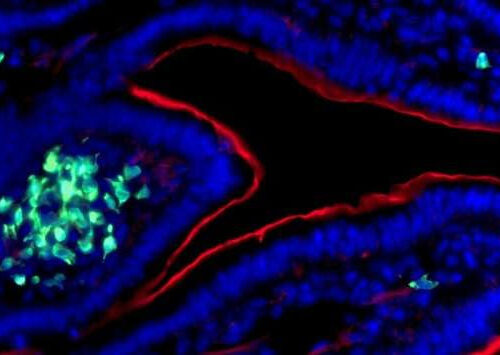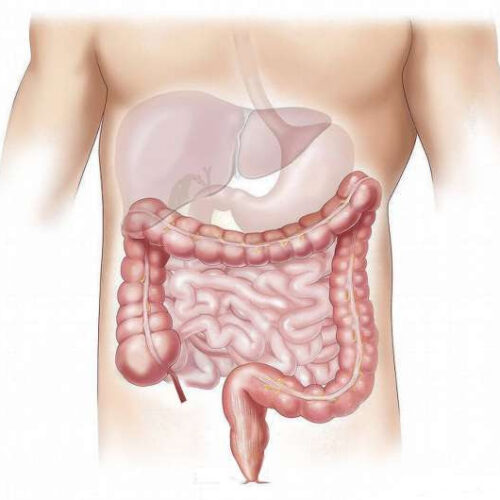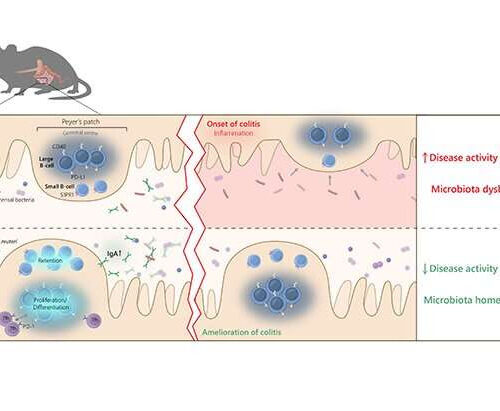by University of Oxford Credit: CC0 Public Domain A new study in The EMBO Journal has revealed how fat tissues might provide a protective role in intestinal inflammation opening new lines of research into the treatment of inflammatory bowel diseases. A fraction of inflammatory bowel disease (IBD) patients, predominantly those with Crohn’s disease, develop a phenomenon known...
Tag: <span>intestine</span>
Study provides insight into how the intestine repairs damaged tissue
CEDARS-SINAI MEDICAL CENTER Investigators at Cedars-Sinai and the University of California, San Francisco (UCSF) have identified a component in the intestine that plays a critical role in repairing damaged tissue. Scientists found that endothelial cells in the lymphatic vessels produce molecules that are essential for the maintenance and regulation of stem cells and tissues in the intestine....
How the intestine replaces and repairs itself
Lymphatic system found to coordinate intestinal regeneration. To act as a robust barrier against pathogens while also absorbing needed nutrients, the lining of the intestines must regenerate on a daily basis to remain equal to the task. The intestine’s resident stem cells are responsible for meeting this need for constant repair and replenishment, but each stem...
Discovery of an innate immunological memory in the intestine
by Pasteur Institute Intestinal ILC3s. Immunofluorescence staining of ILC3s (green) in the intestine (nuclei in blue and actin in red). Credit: Nicolas Serafini—Institut Pasteur / Inserm The innate immune system plays a crucial role in regulating host-microbe interactions, and especially in providing protection against pathogens that invade the mucosa. Using an intestinal infection model, scientists...
It takes cellular teamwork to heal the intestine
by Baylor College of Medicine Credit: CC0 Public Domain Researchers at Baylor College of Medicine have uncovered a more detailed picture of how the intestinal epithelium—the lining of the intestines—heals itself after infection with rotavirus. A meticulous single-cell analytical approach to study the repair process in an animal model revealed that the damaged epithelium contains...
How probiotic bacteria benefit the intestine
by Uppsala University Distinct B cell subsets in Peyer’s patches convey probiotic effects by Limosilactobacillus reuteri. Credit: DOI: 10.1186/s40168-021-01128-4 Interaction between the gut microbiota and the immune system is important for host physiology and susceptibility to disease, but also for the efficacy of e.g., cancer immunotherapies. A multidisciplinary research team have now discovered that specific probiotic bacteria shape...
Anti-tumor agent from the intestine
UNIVERSITY OF WÜRZBURG It is believed to be involved in the development of chronic inflammatory intestinal diseases, to trigger diabetes, to be responsible for obesity, even neurological diseases such as multiple sclerosis and Parkinson’s could have their causes here – not to mention depressions and autistic disorders. We are talking about the microbiome – the...
Biologists find a way to boost intestinal stem cell populations
Study suggests that stimulating stem cells may protect the gastrointestinal tract from age-related disease. MASSACHUSETTS INSTITUTE OF TECHNOLOGY CAMBRIDGE, MA — Cells that line the intestinal tract are replaced every few days, a high rate of turnover that relies on a healthy population of intestinal stem cells. MIT and University of Tokyo biologists have now...
Genome-wide study identifies genes linked to diverticular disease
More than half of adults in the Western hemisphere over the age of 40 have small bulging pouches inside their intestine known as diverticula. Caused by a weakening of the outer lining of the intestine, these pouches are typically harmless. Credit: CC0 Public Domain But for some, these pouches can become painfully inflamed or infected,...
Discovery of long-lived macrophages in the intestine
New prospects in the fight against neurodegenerative conditions KU LEUVEN Macrophages are specialized immune cells that destroy bacteria and other harmful organisms. KU Leuven scientists, Belgium, have come to the surprising conclusion that some macrophages in the intestines of mice can survive for quite some time. Most importantly, these long-lived macrophages are vital for the...




